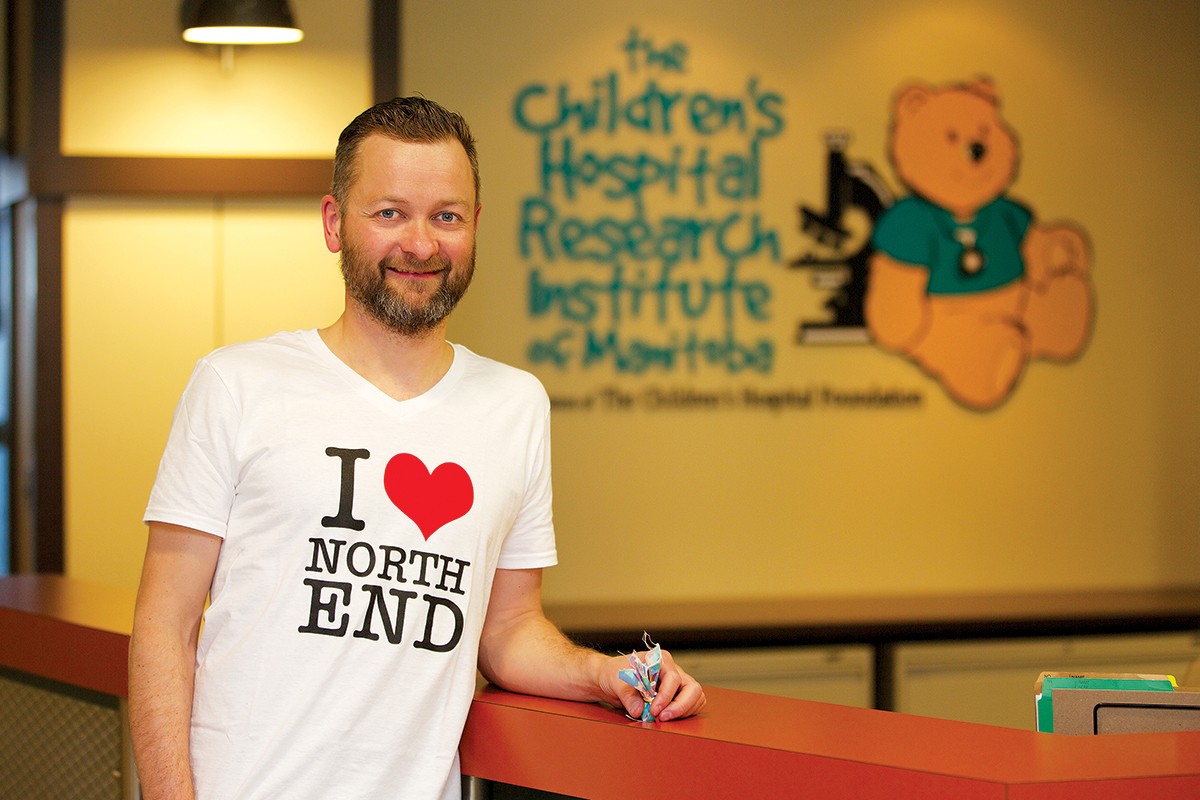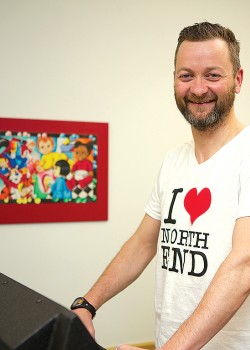
Photo by Dan Gwozdz
In it for the long run
Leading the charge for better health for Indigenous youth
McGavock, an associate professor of pediatrics and child health in the College of Medicine was recently awarded a Canadian Institutes of Health Research (CIHR) Applied Research Chair in Resilience and Obesity.
He is a long distance runner who will be competing in his first marathon this year in Ottawa. The 40-year-old began running when he was ten, eventually running for Sisler High School [in Winnipeg’s North End] and later becoming a member of the University of Alberta cross-country team.
According to McGavock, running not only informs his research, it is also a key to his own personal mental health.
“Juggling all of these different projects can be stressful at times, but going out for a run is the best way to deal with a lot of the issues that come up,” he says. “I don’t worry about what the run is going to do for my body. I think of how it’s going to make me feel mentally.”
McGavock, also a research scientist located at the Children’s Hospital Research Institute of Manitoba, traces his interest in diabetes research back to his undergraduate days.
“I was interested in exercise and physiology, so I was looking for conditions where exercise would have the biggest impact and diabetes came out the clear winner,” says McGavock who completed two post-doctoral fellowships and holds a PhD in Physical Education (Alberta), MA in Kinesiology (McGill), and Bachelor of Physical Education (U of M).
After being invited to work with pediatric endocrinologist Heather Dean, at her clinic at Children’s Hospital, McGavock observed a gap between what he’d been taught in terms of the prevention and management of diabetes and the reality of the barriers facing the young patients he was seeing every day.
At this point McGavock began to examine was missing when it came to diabetes prevention and management, particularly with Indigenous youth.
“With our current medical model, we teach the disease but we don’t always teach the factors that patients are facing,” he says.
One of the most underappreciated barriers Indigenous youth face is adversity, which can manifest itself in different ways.
“First and foremost, there’s transgenerational stress with youth living with parents and grandparents that have lived through residential schools and have suffered through colonization. Another big issue is poverty and food insecurity,” McGavock says. “On a mental health level, these youth are isolated. Not only geographically, but youth who are overweight and living with diabetes are often bullied and isolated within their schools. When young students come into conventional treatment and prevention programs it just doesn’t resonate with them because weight loss or blood glucose control are not top priorities for them.”
“Manitoba is leading the charge in Indigenous health research in youth at the College of Medicine.”
That’s where the work of McGavock’s applied research chair seeks to develop a theoretical framework that moves away from simple diet and exercise and focuses on the issues that are relevant to young people, particularly resilience. The chair will focus on the area of resilience to promote strong, independent youth that over the long run will combat obesity and type 2 diabetes.
The initial model for McGavock’s research outlook was formed when he was invited to Garden Hill First Nation by Larry Wood, the local Aboriginal Diabetes Initiative worker. Wood’s work is challenging as his community suffers from a level of type 2 diabetes in youth that’s significantly higher than the general population.
While there he found that the children, despite the adversity they face, were very resilient and that was where he decided to focus his research.
“The first time you go into a grade four classroom in a remote northern community, the kids are exactly the same as they would be in Tuxedo or River Heights,” he says. “They want to learn, they want to get involved in things and they love to play and be happy. That was when we developed this program to focus on the resilience and on the strengths of youth, rather than on the deficits,” he says.
To capitalize on that resiliency McGavock worked in consultation with Larry Wood and community stakeholders to implement an Aboriginal Youth Mentorship Program, an after-school initiative that provides physical activity, healthy snacks and games for elementary school children and is delivered by high school students. The model, originally developed by colleagues in the Faculty of Kinesiology and Recreation Management Joannie Halas and Amy Carpenter—Rec and Read—is guided by a theoretical framework developed by Martin Brokenleg called the Circle of Courage, a framework consisting of four elements: belonging, independence, mastery and generosity.
Since its inception, the Rec and Read program has been adopted by four more communities across Manitoba with over 300 youth participating.
“I am standing on the shoulders of giants and following a clear path set by leaders in this area. None of this would have been possible without the work that’s already been done by the leading Manitoba scientists and Indigenous scholars that came before.”
“The success of this program would be making it available to any Indigenous child in any region in Canada and support their goals to wellbeing and a healthy life.”
Recently, Research Manitoba announced $2.5 million in funding for DEVOTION, a new research network in Manitoba focused on the developmental origins of diseases, led by McGavock and colleague Andrew Halayko. This new network will focus on improving health outcomes among Manitoba’s children and youth through transdisciplinary work between scientists, policy makers and community partners.
The DEVOTION network will bring together clinical and basic researchers from multiple disciplines to create a team that will work together to unravel the early life determinants of chronic disease in children.
“Some kids get a chronic disease and others don’t,” McGavock says. “We’re asking what we can do in the early years to prevent that from happening.”
DEVOTION also includes an advisory stakeholder group consisting of Indigenous community members and organizations, policy makers and health care professionals that will guide the research program.
“That’s really an important piece,” McGavock says. “The research of DEVOTION is going to be driven by the needs of community members.”
Collaboration plays a significant role in McGavock’s work and he is quick to credit the many mentors and health professionals who have come before him to make his work possible.
“Manitoba is leading the charge in Indigenous health research in youth,” he says, mentioning the pioneering work of professors Heather Dean, Patricia Martens, Sharon Bruce, Barry Lavallee and Catherine Cook in the College of Medicine.
“I am standing on the shoulders of giants and following a clear path set by leaders in this area. None of this would have been possible without the work that’s already been done by the leading Manitoba scientists and Indigenous scholars that came before. They’ve made it possible for someone like me to come in and do this kind of work.”
This story was originally published in the Summer 2015 issue of Research Life.







